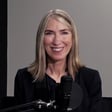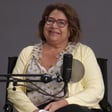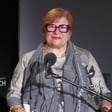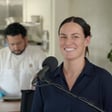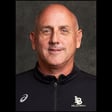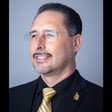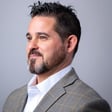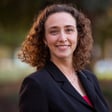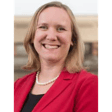Become a Creator today!Start creating today - Share your story with the world!
Start for free
00:00:00
00:00:01

Supporting students' well-being
Danielle Muñoz-Channel explains how CSULB's Basic Needs program supports students.
Transcript
Introduction to 'At the Beach' Podcast
00:00:17
Speaker
Hello everyone, I'm Dan Montoya, Vice President of University Relations and Development at Cal State Long Beach. Welcome to another episode of At the Beach. This podcast is all about sharing the incredible stories, achievements, and opportunities at the beach.
00:00:31
Speaker
Whether you're an alum, a student, or just someone who cares about what's happening here at Cal State Long Beach.
Introducing Danielle Munoz and Basic Needs Program
00:00:37
Speaker
Today I'm really excited to sit down with Danielle Munoz, our director, the director of basic needs.
00:00:44
Speaker
Danielle leads a dedicated team of professionals, graduate students, and undergrads who run a critical program, critical programs like basic needs, CalFresh Outreach, CalFresh Healthy Living, and the Peer Navigators program.
00:01:00
Speaker
If you're not familiar, the Basic Needs Program is all about supporting students who are facing challenges like housing insecurity, food insecurity, and other crises. It's about removing barriers and giving students the tools to persist and thrive in their education.
00:01:17
Speaker
Danielle, who was a licensed therapist, brings a wealth of experience to this role. She has a master's in marriage and family therapy from Cal State Sacramento and a sociology degree from UC Davis.
00:01:29
Speaker
Danielle, it's a pleasure to have you this morning. Good morning. Thank you. So Danelle, you and your team are doing a lot of great work to ensure our students have the support they need.
00:01:40
Speaker
Let's dive in and give listeners a deeper look into what you do. Can you share a bit about your journey to this role and what inspires you to focus on supporting students in crisis?
Danielle's Career Journey and Mental Health Integration
00:01:52
Speaker
Yeah, well, thank you. It's really great to share this space with you and talk about the subject that I think I'm very passionate about and a lot of people really love here and support. um But, you know, I actually didn't find myself in basic needs at first when I came in 2016.
00:02:10
Speaker
I was actually um working in an emergency room helping program that i that i helped develop supporting folks that were on a psychiatric hold and experiencing homelessness. And then our team would follow them out for 30 days and make sure that those you know resources landed.
00:02:27
Speaker
whatever's on their discharge plan. So was very well connected in the community, you know leaned on a lot of different agencies to help these folks, and then we reduced recidivism in the ER by 15%. So I loved that work.
00:02:39
Speaker
um Oftentimes, clinicians, in order to stay out of you know ahead of burnout, we tried to rotate you know our settings. And it was time for me. I had done my time in ER work. That was very intense.
00:02:50
Speaker
And I found this position. It was the case manager position. it was the first one. I did not know that, actually, until I got into the application process. And for the campus, it was new. They've never had a case manager before. right And for me, universities were new, which now, years later in higher ed, I realized, wow, I really did step in a whole new world and ecosystem. Right.
00:03:13
Speaker
um At that time, just under the brilliance of a the Dean of Students, Dr. Beth Lesson, who now is our vice president here Cal State Long Beach, um she thought about it and i think she worked, she has experience in in that world of mental health. And so she saw the value of bringing mental health practitioners in in terms of case management. Of course, we already have our CAPS counseling team.
00:03:37
Speaker
So I actually started as a behavioral intervention team case manager where I just met with students who faculty felt where they were concerned about their behavior. But when we cast the wide net and we said, just bring anyone in that you're concerned about, you know, what started coming in was i lost my housing.
00:03:55
Speaker
ah live in my car. I'm not me eating. And even I was shocked that the things I saw in the community as a therapist were happening on a college campus. And then Rashida Crutchfield and Jen McGuire, um dr Rashida Crutchfield here at Cal State Long Beach and Dr. Jen McGuire from Humboldt, they released their study that was commissioned by the chancellor's office on food insecurity and housing insecurity.
00:04:18
Speaker
And so their data really tracked with what I was seeing as a case manager.
Program's Focus on Essentials and Student Success
00:04:24
Speaker
Right. And that just started ah whole journey of data that we started collecting, advocacy, and then legislation started to develop, and then funding started coming. and now, here we I am. like All of a sudden, I'm running a basic needs team. So it was a really cool you know evolution of my job description and what I came to do and like what it is now. Wow. It sounds like you were...
00:04:49
Speaker
in preparation for this job even before you got here you know, to Sacramento State. And then I remember Beth, Vice President Lesson, talking about you before you got here.
00:05:01
Speaker
So she had a vision in mind of somebody who was going to be amazing and dynamic in this role. Talk to us a little bit about what basic needs entails and and kind of how it how it functions here at the university and and how do students access that?
00:05:17
Speaker
Sure. So basic needs, we cover all of your essentials, like your food, housing, financial resources. um You know, these are the basic things that if a student doesn't have housing, doesn't know where they're going to get their next meal, doesn't know how they're going to pay their bills, they can't take advantage of all the wonderful talent that we have here at Cal State Long Beach. All of the faculty that we intentionally hire, the programs that we carefully curate.
00:05:42
Speaker
They can't engage in any of that. So I think basic needs, our North Star is, how can we get you back on your feet and back into all the great things Cal State Long Beach has to offer?
Mental Health Support within Basic Needs
00:05:52
Speaker
Yeah, and I think when you think about our students, they're really highly qualified.
00:05:57
Speaker
And they have so much potential. And it's almost like they they just need the environment to succeed, right? And so I think that's what I like about the program that you do. and and But also, it's it's also, I mean, there's other programs that I assimilate this to. When I think about Guardian Scholars or Project Rebound and stuff, there's a ah huge mental component to this.
00:06:22
Speaker
Maybe talk a little bit about that and, you know, what it takes for a student, even though they have all the aptitude and and the skills to do it, it's that fundamentals, the mental piece that is that needs to be worked on and developed.
00:06:39
Speaker
Absolutely. And i I do agree that universities have been taking great care of their students for many years before, you know, basic needs and social workers started to come on board.
00:06:50
Speaker
But we're trained on, you know, some unique dynamics like hearing the unsaid, reading between the lines. Hitting the hard points with compassion, or we call it like care-frontation.
00:07:04
Speaker
um Reflecting back what people are saying to them so they can hear it. um Helping them imagine the possible. Picking up on things like imposter syndrome or picking up on traits from trauma that may be leading to some self-sabotage. We can see those things and when we talk to a person. So it's one thing to just tell a student, go to the pantry,
00:07:25
Speaker
And it feels, you know, fine to give them that resource. But it's another to say, how do you feel about going to the pantry, though? Because there's stigma there. yeah And so we are really trained to get into those conversations with students and like melt like melts off some of their fears, anxieties, stigmas, so that they feel comfortable going to those places. Right.
00:07:46
Speaker
And also making meaning of it and ah so that they see that this is temporary. And the most important one, and you kind of touched on it, is we assume that you're bright and you have potential and you already come with wealth. We are very lucky to have you as a student. I tell all my students that.
00:08:02
Speaker
um And this is a circumstance. So we're going to get through the circumstance, but I see your character. You came to Long Beach, like only the best and brightest get in. um And so let's get you back on track for what you came to do.
00:08:15
Speaker
And I think that has been a beautiful journey is just to go there with people to some of those spaces and not in a counseling way, but more like a coaching way. um as a case manager yeah and just say, like, here's what I heard you say. well what do you think? Like, I think that might get in the way of some of our work here. yeah And they they really come out with some good gems and then they put things together and then they're like, oh, yeah, I see see this. And then they're like totally ready to take advantage of resources.
00:08:43
Speaker
Yeah, and i I think, I don't know, what I've noticed, because my son's in college too, and and I noticed that they they're under so much pressure from many different areas. And and what I also realized is that there's so much information coming at them, and it's hard for them to to kind of process that. And even even also like peer pressure.
00:09:06
Speaker
from social media, from anything. So I can understand what you're saying. If somebody, you know, walks into the basic needs or something, you know, they they could feel like, oh, wow, somebody's going see me or or somebody's going to post it or something. And and there it's just it's just a different kind of pressure.
00:09:23
Speaker
how How is your you're training in the and the mental space with them? You know, maybe talk about some examples of – Students that you've really kind of navigated to that. And then what you're seeing, how you're seeing them flourish, because what what what we're talking about is like the services that you have. But now it's about I when when we see them get through those initial barriers and then we see them flourish, we see them grow and continue to excel.
00:09:55
Speaker
Absolutely. We have emergency housing. And so a lot of our students come to us that have been living in their car and, you know, we're assessing them for emergency housing program and we'll house them. You know, they could stay with us while they meet with a case manager weekly and they're doing housing resource navigation. And then, you know, when they find their place, we pay for their deposit.
00:10:14
Speaker
So we have this really great clear cut process. Right. Well, it takes a long time to do it because of the nuances of the psychological
Impact and Success Stories of Basic Needs Program
00:10:23
Speaker
impact that students have where they can't believe they're even going into emergency housing.
00:10:29
Speaker
um they you know i mean i can think of a young um gentleman that I worked with. He was a veteran and served our country and through just a series of unfortunate events, ended up in his car and our Veterans Success Center, which is amazing program here.
00:10:44
Speaker
um They referred him over and what Even though we had this clear-cut pathway, like we can put you in housing, then you're going to meet with a navigator, can help you get a job. like All the things are in place, but what was really happening for him that we needed to stop all that and really talk about was like the psychological piece. All he could see was failure.
00:11:04
Speaker
And sometimes they're not ready to just jump right into therapy, but they can be open to still coming to see us. So we often want to get them to therapy. That's the ideal thing. And we talk about that.
00:11:16
Speaker
But it's ok sometimes we just have to sit and say, like, tell me more about what is getting in the way of wanting to go into the program. Yeah. and He just felt like it was a failure and to go into the program would just solidify that. So we just had to sit and have conversations about that and get to this point, like I was saying, where you're not your circumstance. This is just a circumstance. Your character never changes, even if your circumstance does.
00:11:41
Speaker
And your plan, your goal never changes, even if the path there does sometimes. um And so to make meaning of that, to widen the perspective that was able to get him in and on the way. And he reached out recently because he had graduated and he asked for a letter of recommendation for grad school. Oh, wow. That's great. So I was just so happy for that. But we have another young lady I can think of where her brother was deported and left with her father who just was abusive and neglectful and never really played a part anyways in her life, was more the mother.
00:12:15
Speaker
and she was starting to experience some pretty severe depression and suicidal thoughts and knew that she needed help. So she reached out to us, and she was getting into the program. She was willing to go into emergency housing, and she had a job. but But for her, it was just this deep grief and trauma of losing her mother to deportation.
00:12:34
Speaker
having to still go to school, having so many insecurities about what it means to be someone's friend and date and like, like what does this mean for me? Because she had so much on her mind, she couldn't just like let loose. right So she felt like, I wanna be social. She's like 20.
00:12:49
Speaker
Yes, I wanna start my college social life here, but I can't get to where the students are. Like I am so depressed. And so we she has a counselor and we got her some support. But yeah, you know, she's kind of left out of the social piece because of her circumstance. So they do go
Philanthropy and Additional Program Needs
00:13:07
Speaker
through so much when they get here. But all we can see is who they are in the future.
00:13:12
Speaker
That's all I see. I see this wonderful, amazing person. i just need to get you through this little bit so you can keep going. Yeah, I think that's amazing. and And so when I hear that, it also kind of reminds me of of philanthropy too, right? In the sense of when we bring in our donors and we explain what these programs are, they tend to invest in the potential.
00:13:37
Speaker
And that's really what you are all looking at is we see where you are in this raw product, but we know what the finished product will look like. And so we just got to get you through that process to get you there. And so it's it's a beautiful journey. And I think a lot of people think of students who just come to school, think, you know, you pay your tuition, you attend classes and all that. But the majority, I would say maybe 80 percent of the learning doesn't even happen in the classroom.
00:14:05
Speaker
happens outside the classroom. And these are the experiences that they have and they continue to grow in that area. So in addition to basic needs, talk to us about CalFresh Healthy Living.
00:14:18
Speaker
Yeah, so CalFresh and CalFresh Healthy Living, those are our two federal grants that we have here. They are game changers. um Through our CalFresh outreach program, we're able to hire a team of students who do outreach to the campus about public benefits.
00:14:33
Speaker
and And one particular public benefit, CalFresh, and I know it was formerly known as food stamps. So like our older generations will know it as that, and the newer generations know it as CalFresh. Nationally, it's called s SNAP, Supplemental Nutrition Assistance Program.
00:14:49
Speaker
So I have to remember that when I'm presenting outside of the state because I'll say CalFresh and I get a lot of curious faces in the audience and I say SNAP and then people you know recognize that.
00:15:00
Speaker
um So it provides monthly grocery assistance. So you can get ah up to $291 a month in funds on a debit card and students can buy groceries with that. And around 2017, they opened up eligibility to students.
00:15:14
Speaker
So through the CalFresh grant, universities are now able to concentrate efforts on our campus to notify students of this new eligibility, to make sure that they get pre-screened.
00:15:25
Speaker
We help them get all their documents in. um It's quite a bit of a process. So our students go side by side and help their peers sign up for this program and then they get money.
00:15:36
Speaker
and What I like about CalFresh is they have a thing, a program called Restaurant Meals Program. So if you're living in your car, have a disability or you're elderly, and you don't have a way or a place to cook and prepare your food, it will let you buy hot food.
00:15:49
Speaker
So this really does open up um the doors to food access for some of our most in need students. And then CalFresh Healthy Living works alongside them to teach the CalFresh recipients how to spend their money and what to do with and how to cook food.
00:16:04
Speaker
So they do cooking demos. They do like harvest of the month. um And they really teach the students how to do this. I have seen in my work that is one of the biggest challenges our students have is learning to cook and prepare food and then take it to school and be at school all day. That's impossible.
00:16:23
Speaker
And I know staff and faculty who say like I eat on campus a little too much. Yeah, yeah, yeah. So this program is really great. And I think the CalFresh Healthy the Living team um puts a little bit more intention on you have your benefits.
00:16:37
Speaker
Let us teach you how to cook on the go. Let us show you the foods that you can bring that will last you all day on campus so that they really make sure that that works for the students. That's great. And again, these are life skills. These yeah these are skills they're going to take on even even after State Long Beach.
00:16:54
Speaker
I think the other thing that I i think about when and I look at this whole program, you know, when when we're talking about donors or people who would be interested in supporting this program, what?
00:17:09
Speaker
Why is it so important? and And again, it's you're you're giving them the fundamentals so that they don't have to stress out about that and then they can actually focus on their work, right?
00:17:21
Speaker
And so I think that is an important piece of what you're doing. Based on how you built the program, what else would you need to take it to the next level and serve more students and really create you know ah student body that is thriving?
00:17:39
Speaker
So those, um and so bricks are built based on student feedback. And some of the bricks I'd love to still add to this you know beautiful like program that we're building is student parents need housing.
00:17:52
Speaker
They are 20% of our campus, over 8,900 students, and they often um cannot find housing um that's affordable for them and their children. They have a higher cost of living because they have more mouths to feed.
00:18:08
Speaker
And they also sometimes are needing like more accommodations because they may have to work and have child care, you know, or go to school or they have a trouble finding affordable child care. So for, so especially for our single parents, they're working and,
00:18:25
Speaker
you know, taking care of kids and going
Challenges for Diverse Student Groups
00:18:27
Speaker
to school. And so it's almost impossible to do that. and But one thing that could help them is definitely some so ah better flexibility with our parents, student parents, and some housing, or at least some more funding for affordable child care. So we do give quite a bit out to our of our grants to student parents.
00:18:46
Speaker
um for those things. So we're able to help and the the help we've seen so far is so impactful for them. I would love to just keep that going and growing. And then the other one is that our undocumented students, they don't qualify for federal aid.
00:18:59
Speaker
So they often have um quite a big um unmet need. gap between what it costs to come here and then what they receive. So we really try to support them as well with grocery assistance and um yeah affordable housing and just like, like just and I would say almost like a universal income.
00:19:20
Speaker
You know, just here's some money so that you can cover your utilities and things like that because they can't work. you know And they can't get aid, so they're really stuck. But again, we are seeing bright, wonderful minds here.
00:19:33
Speaker
Like them as a person, they have so much potential to make significant contributions to our future. and the I've seen science, like STEM majors, the arts, like they're on their way.
00:19:45
Speaker
um and we could really benefit as a society from what they have to offer us. And so I would love to help them get to the finish line. But our student parents, undocumented students, our foster youth often also really struggle because they don't have parents. So it's kind of like I remember in college when I needed like a tire repair, call my mom.
00:20:04
Speaker
But if you don't have that person. you don't have that money. So we often try to fill the gap for them and, and you know, and give them support. But um the other one is that I would love to give our commuter students more meal plan support. We have great dining halls on campus.
00:20:20
Speaker
And again, our commuter students typically try to stay home to save money, but then they commute in over like an hour away and they have to stay on campus all day. And if I could just give all the commuter students, you know, a meal plan, I would just love that.
00:20:33
Speaker
So there are some things that I could see, you know, that would really be helpful. Yeah. So how much does a meal cost on an average per se? Like maybe $12 to $15. Okay. Yeah.
00:20:45
Speaker
Yeah. And for those that you're teaching how to cook, where do they keep their food? Like how do they store it? Yes, exactly. So meal swipes, we give out over 6,000 a year. Those have been like some of our most significant points of help for students because they don't, they can't store it.
00:21:04
Speaker
and we will We purchase now some lunch bags and we have utensil kits. So students can come and pick that up at the basic needs office to help a little bit with that. But really they don't have a place to store groceries.
00:21:17
Speaker
um During their day on campus. So so really meal plans and dining halls are the best and I know at another university um Well, my when I went to my undergrad at UC Davis They had like a co-op style in their student union where it was like a burrito bar a salad bar a sandwich bar and then it was um you pay by weight So if I'm low on funds that week, my you know I just make it a little different.
00:21:42
Speaker
But you can what it was teaching me was how to make ingredients, like how to use ingredients to prepare a meal. And then weighing it gave me the flexibility to pay what I could. right That's the best model um for a student union is to have ah a style where we just offer these little bars and they can make it themselves like a Whole Foods. Right, right.
00:22:00
Speaker
And so, i mean, I know we're we're going to bring on a new student union in the future, and I know there's a lot of opportunity for us to continue to develop that. So hopefully that will be a key opportunity in the future.
00:22:15
Speaker
um so Is there any other things that you think we could encourage our our donors or people out there who say, you know, how can I help? i They'll say, hey, I heard the podcast and and I heard of all the great things that you're doing and and you're creating amazing students.
00:22:35
Speaker
What else? Yeah, I think that's a great question. And we have had so much support from like from the community when people hear about these stories. But one thing the students really need is hygiene items.
00:22:48
Speaker
And I love when people donate like um feminine hygiene products, toothbrushes, toothpaste, shampoo, conditioner, like deodorant, because those are all things that are really important when you're sitting with your peers in class to when you're going to an interview, when you're on the job, when you're dating.
00:23:03
Speaker
It's all aspects of a student's life to have good hygiene. So when when folks donate hygiene products, that's been very helpful.
Statistics and Parental Sacrifices
00:23:11
Speaker
and We can just keep it out in our front ah lobby. um The other one is donating to the emergency fund for our hotel vouchers and our housing.
00:23:19
Speaker
We have so many students that come through our housing program. And some of them, they have parent like partners, you know, or because of their trauma, it's better that they just have their own room. So sometimes a hotel nearby is easier.
00:23:34
Speaker
So us having that flexibility of saying, OK, I'm going to put you in the hotel for now, especially during finals week. Right. If I find a student in their car and we're going into finals, they're absolutely getting housing. like No questions asked because you need to have housing to do your finals, right?
00:23:48
Speaker
So I'd love to be able to put them into a hotel or on campus. um And so when people donate, which we do get quite a bit of donations to housing, that has been incredibly impactful. And we can buy meal swipes, which is one of our favorite programs. And we get a lot of rave reviews from the students. Like that actually helped me eat.
00:24:06
Speaker
Because a lot of them, they don't have money. If we don't give them this support, they won't eat. And the pantry is wonderful, but they would have to take their groceries home and then cook it. So sometimes while that is a really great donation, if that money could have been a meal swipe, sometimes for some students, I think that works just as well.
00:24:25
Speaker
Yeah, I mean, and and if they don't, they're not nourished, it's it's hard for them to learn because they're distracted. They're worried about other things. um And how many students do you guys serve on an annual basis? I mean, and this is this is kind of like an opt-in, right? not Not everybody takes advantage of it. But how many students would you say you guys serve on a yearly basis?
00:24:48
Speaker
So at a total number is about 10,000 to 11,000 students. Wow. Okay. About 8,000 to 9,000 of those students are any combination of CalFresh, you know, pre-screening, application assistance, meal swipes, food pantry referrals.
00:25:01
Speaker
And then about 1,100 come in specifically for um housing and financial crises. And then every year we serve about 60 students in our emergency housing. um and so And then ah another maybe 30 in our rapid rehousing, which is when you're living in your car and we can help you get into a lease through one of our partner agencies in the community. So we have a total 10,000. on our campus, five so about 5,000 of our students experience housing insecurity of some kind, couch surfing or homeless.
00:25:34
Speaker
which is a lot. ah it is And it still shocks me to this day. I never get over that number, but it is you know we see it. um And then about 56% of our students say that they're food insecure, which we think a lot of it is the commuting piece, not having the the ability sometimes to just have food on campus with them all day, so they just skip meals.
00:25:54
Speaker
Yeah, I mean, i yeah again, my son's in college, and i I just can't imagine him having to deal with those kind of things. Fortunately, I've been blessed with the opportunity to provide those, but there's a lot of parents who are not in that situation, and but their desire for their children to go on and, you know,
00:26:13
Speaker
change the generation of their family right and that's really what a lot of these first generation students is about is creating an opportunity for them to even be better than what they grew up in and so i think you know a lot of parents sacrifice because i know parents you work two three jobs and you know hear a lot of these students you know talk when they when they graduate and say yeah my mom you know worked two three jobs my dad worked two three jobs just to get us there and and and help us uh elevate ourselves to college and i think that's a powerful message so i think you know if i if i look at what you're doing and yeah i would say you're you're doing the lord's work and taking care of people and helping them
Accessing Program Details
00:26:55
Speaker
learn grow in advance and and i think that's what i've always said that i i'd like to do as well and so we're grateful for the work that you do
00:27:03
Speaker
And so, you know, we we hope that the listeners today would well think about, hey, how can i make an impact? How can I help? How can I help Danielle take this to the next level?
00:27:16
Speaker
Where can they find more information about all the programs that you're talking about? Yeah, we do have a website um that I don't know the long URL for. Okay. ah But, you know, if you do CSULB basic needs, it will come up.
00:27:30
Speaker
Okay. And if you do, you know, CSULB cscl be ai Pantry, the Lauren Chalmers Beach Pantry will come up so they can see both. The Beach Pantry does a beautiful Amazon wish list ah that they curate. So um they actually survey the students on their cultural food preferences and then add those responses to the wish list.
00:27:49
Speaker
Okay. So it's really cool. So you can um you can always donate to the pantry through their website and read about all of our services and donate through the basic needs website. um So we have that there for students.
00:28:00
Speaker
And we also have an Instagram that I want to lift up because my student team has really taken this on as part of their help. They want to help address the stigma of basic needs. Right. So what they're doing now is this whole like social media campaign where they just de-stigmatize it, they demystify, they introduce themselves.
00:28:20
Speaker
So our um basic needs CSULB Instagram has been just wonderful. I just see the evolution that our my students have taken it to. And sometimes they'll say, we want to run this trend.
00:28:33
Speaker
you know And I'm like, I've never heard of it. Do it. Because if I've heard of it, it's outdated. Right. yeah Yeah. And I also know that you you post on LinkedIn as well as professionally about all the great things that you guys are doing. and And it's amazing throughout the year how how students can continue to get the services they need to go on and be successful.
Danielle's Leadership and Military Influence
00:28:53
Speaker
So I appreciate you and and obviously the vision of Vice President Lesson to bring you on board. Yeah.
00:29:00
Speaker
and And I've seen it grow. I've seen a lot of the great work that you guys are doing. And so continue to to do that. Now, let's dig in and a little deeper to who you are. Talk to us a little bit about you and your... your I know you we know where you went to school and you got your education, but...
00:29:17
Speaker
what what makes you What makes you want to keep doing this and what what inspired you maybe to get into this field of work? Because you talked about being in the medical field and the passion you have for helping people. Where did that come from?
00:29:37
Speaker
Yeah, I think about that too sometimes, like what what drives me Because i just love this work. And um I can think back, you know, I came from a working class family. My parents actually me very young, like right at out of high school.
00:29:53
Speaker
And at that time, i i'm from El Paso, Texas. ok And, you know, strict Catholic families. um They had to get married. Like, you have a kid, you know, right? As an 18-year-old, then you're ready for the next step.
00:30:06
Speaker
So my father actually joined the Marine Corps. Oh, good. Yes, and he um did that because, well, he always wanted to serve his country. He said he'd always felt called, but also that it would be a great opportunity for my parents to start their life in a stable way.
00:30:21
Speaker
um but that took us out to California, and I grew up on the Camp Pendleton military base. Okay, okay. And that was quite an and experience. It's very unique. um I think if you've grown up on a military base, you kind of get it that the military operations happen first, and then you live there.
00:30:39
Speaker
um We were just ah side thought. So, you know, I was really around a lot of like war tanks and Marines and they're doing their cadence and working out in the morning. And my soccer practices were interrupted by helicopters needing to land in a very much dominated situation.
00:30:59
Speaker
thing And we were extensions of the Marines. So the character building, the leadership, the service, the loyalty, right? Semper Fi. So right my dad would tell us, you know, we're going to school like, ooh, raw, devil dog.
00:31:14
Speaker
That's awesome. um And just being, you know, we grew up eating on, well, we would shop at the commissary, you know, that kind of thing. So, and then we would, we were stationed over in San Antonio, um back to California. So along with that was also yanking us out, at you know,
00:31:34
Speaker
just out of school whenever and you had to be the new kid again in like October or like April, you know, these random middle of the semester times. um So it took ah just a lot of for us. It was just like change, right? Change was happening constantly.
00:31:51
Speaker
And that was the norm. So I think now I feel like that's why I'm not afraid to trailblaze and that if I see something that needs to be done differently, let's do it. That's right. And if there's injustice, let's correct it and let's stay on the mission. and And I'm very mission driven, as you can imagine. Like you're in the military. I feel like you would get that like.
00:32:15
Speaker
that stays with you, like how important mission is. I do a lot of forecasting and strategy. very Everything's very intentional. um And I take care of my team. that's right Collaboration is the default, right? So all of those things that formed my childhood form my leadership style today.
00:32:36
Speaker
um And so I do see that we have a lot of food and housing insecurity. People should not be on the streets. These are a human rights. And I have the ability to think differently and creatively, and I'm not afraid of change. So let's get these programs started. Let's get this up and running. I never see a barrier.
00:32:55
Speaker
Sometimes I say, why haven't we gotten the this done before? Well, It would take a lot of paperwork. Let's get the paperwork done. That's right. That's not a barrier to me. That's just a step. Let's get it done. Yeah. Well, I mean, that's so awesome. I mean, having served in the Navy as well. And the Marine Corps is is a whole other level, whole other breed. and But you know I understand what you say. you know You have a target, and you're going to hit that target no matter what.
00:33:24
Speaker
And it's just a matter of, tell me tell me what the target is what time you want me to get there and what I have to do to work with to get there. and And that's what you do. So, you know, I really, in just in talking to you, i see how you're so relatable to these students.
00:33:42
Speaker
You're so relatable because you experience change. and and And honestly, I mean, I'm not going to say this is in a negative way about the military, but Military families don't get paid that much money, you know, and some some of these folks work additional jobs because, you know, it's it's not high pay.
Mentorship and Guidance Impact
00:34:00
Speaker
And so if you have like two, three children, you got to balance how how it works, even if you go to the commissary or if you have services and all that. But it's it's not easy to be in the military because, you know, you you don't get all these, you know, money resources, but you have other resources that you're available to.
00:34:21
Speaker
the military as well. But I see how you were, you're able to be creative and, and navigate those challenges. And then also, you know, but, but also you, you have discipline to problem solve, right.
00:34:35
Speaker
And to have perseverance through adversity and regardless of what the change is, um you're going to get through it. And I see you doing, imparting that into these students as well, because there To them, it could be ah an enormous challenge that ah they say, I don't know how I'm get through this or I don't know how I'm going to make it you know to the finish line.
00:35:00
Speaker
But you already see it, and that's the beauty of what you do. And so I think it's so great that that you know everything that you have done has brought you to this point. It really has. So I'm excited to see of where you go next right and and and what this program does.
00:35:15
Speaker
um Is there any... I mean, you I think you can probably talk about your father or or some of the experiences you had. Is there any one experience, book, lesson that you've heard or speaker that has really inspired you to to continue to grow as a person or in your profession?
00:35:37
Speaker
Oh, yeah. I mean, I call on a lot of you know different inspirations and people. i do love to see um people like live their best life, and um i love to join in that and and also just learn from people. Right. But also lift people up and celebrate other people's accomplishments. and Well, I saw my mom my mom is, course, going to be one of my core memories of somebody who, man did she do it?
00:36:01
Speaker
like she My dad would be deployed for nine months now. sometimes 12, and she was a single mom holding that house down. It was because of her that we were connected to programs like AVID, EOP, um that we used. Literally, I am and it was in college because of AVID, and then I finished college because of EOP, literally. that goes And I still to this day keep in touch with one of my EOP advisors. He will forever be a beacon for me.
00:36:28
Speaker
um And she helped us make sure the money made sense, like she would help us with our FAFSA and everything. So because of her, um yeah, we really were able to get a future. And my dad, because of him, we were able to have a stable life. Like he's so he served his country. Then she kept the family together for that time.
00:36:47
Speaker
um But yes, so EOP, I remember as young as like UC Davis, they they have a program over summer that we can go and live there for a month and kind of practice college. And one of my advisors, Caleb Hervey, he was just like an incredible support for us, just always seeing the best in us.
00:37:04
Speaker
um But I can also think back before that. There was this woman in high school that when I was a high school student um and I swam on the swim team and her son was on the swim team. So she saw me and she just said, hey, come to my office every week.
00:37:16
Speaker
I was like, OK. And she would give me his paper applications. That tells you what year this but so generation. um She has fill this out. It's a scholarship. I'm like, what's a scholarship?
00:37:28
Speaker
And I fill it out. And she's like, fill this other one out. Okay. And she just has me come back every week. And I'm just going back. And she's like, take this one. Now this one. Now this one. And then May comes around and they have their scholarship award ceremony.
00:37:40
Speaker
Well, end up getting like 10 different scholarships. Wow. Totaling like $15,000. That's awesome. from anything that i she saw me doing. So it was sports, faith-based things, just like being a Latina, first gen.
00:37:56
Speaker
What she was doing was helping me apply for scholarships. And she said, you're going to go to your your teachers. You're going to ask them for a letter recommendation. and so I would do that. like She would just walk me through the process. Let me tell you, I had no idea what I was doing. i was just listening to her. she she was i trusted her.
00:38:12
Speaker
um But because of her, and i was able to go to college and whatever FAFSA is covered, you know, the scholarships covered the gap of it. And I was even able to do like study abroad and things like that because I had the money. So i take from her and from the EOP folks and somebody like Caleb that just how our role is so significant to students here.
00:38:37
Speaker
Just like that changed my life. And then Janice Moran, she was part of the um Bonner Leaders Program where we did like a service-based learning. right and I had to do my 900 hours to get my money. um And you know, I was out there painting houses, taking care of babies, planting plants. i i did all the community service I could and you'd get your money at the end of the year. and But she would sit us, well, she would have like these instructional classes every week where she taught us how to do a planner.
00:39:03
Speaker
And I just remember like that blew my mind, like a planner. and just because And she can forecast like what these students didn't know. um and then being a first generation Latina where my family's like, it would have been more helpful if you just went into the workforce.
00:39:18
Speaker
But I guess you want to go to college. We can get around that. um You're not making money for your family. right So you are really trailblazing into this new world and everybody's really trusting that this is going to have a good ah ROI at the end by you going away for four years and not contributing.
00:39:33
Speaker
So she, for her, i think that made the ah ROI work. Like she was teaching us skills that was getting me to be employable, that now I can do all these other things. Because really that's the pressure of working class families when they send their kids off to college. First generation college students are are pros at the working class work ethic. They watch people
First-Generation Student Challenges
00:39:54
Speaker
do labor. Like they are they got that.
00:39:57
Speaker
um it's ah It's a risk these families take to say, okay, we're going to send you off and we have to pay for this um versus you just going right into the workforce and helping us. um So we have a lot of pressure to have the ROI come back to our family. So those people really help us and then or have helped me. And then I do remember Sonia Sotomayor, just our ah jesus are Justice Sonia Sotomayor.
00:40:22
Speaker
She is just a phenomenal woman. I've listened to her talk like three different times in person. And one thing stood out to me that really helped me with my own approach.
00:40:32
Speaker
And she went to when she went to college, she had a roommate who was a white woman, seventh generation college student. hmm. And because of her roommate, she learned about what the honor societies meant.
00:40:44
Speaker
And so when she, you know, or just any, all of those like nuances of the university, she would have never known. And she said one day she got an acceptance letter into an honor university and threw it away. And her roommate pulled it out and trash. She goes, what are you doing? She goes, they asked me for money. I don't want to, why would i do that?
00:41:02
Speaker
She's no, this is like a society that even I can't get into. that I didn't even get into. You need to pay this. I'll help you. And you get into this. And she said that on her resume helped her forever. But she said, make people outside of your own comfort zone or outside of your community, because sometimes you can leverage people's privilege and they can use it as a good thing um by just showing you the ropes of a world that you're not part of.
00:41:25
Speaker
And I love that. And I will always... value people who are willing to show me the ropes of a world that I'm not a part of. um And that has certainly happened. Beth Lesson, Dr. Beth Lesson has been also a mentor. Like when I was new to higher ed as a case manager, she already knew what I'm going to need to know. And she taught me how to be in higher ed, which now I know years later, that is a whole skill. It is. Yeah, you're you're absolutely right. It's a whole ecosystem and you need to know your part in it and how others work as well. So I've had incredible people that just have watched out for me, helped me, and then they knew that I have potential, you know, and they believed in me. So I want to be that for students.
00:42:05
Speaker
Yeah, I 100% agree with you because I feel the same way. And and I mean, our story very similar. But I think there are so many folks and alumni and just people who are associated with this university that want to help students succeed, you know, because they have similar stories, you know. and ah Unfortunately, there are some students that that don't finish because they run out of funds or or they have to go contribute to their families
Basic Needs Program Anniversary and Future Goals
00:42:32
Speaker
as well. And I think our message is like, look, if you just finish, you're going to help your family so much more if you get that education. And so I think...
00:42:42
Speaker
I think that's a great message. But, I mean, again, i just i just just hearing you and hearing your story is just so inspirational, not just um not just for me, but I'm sure students that you help, but but your peers and your colleagues as well. So i we could we could stay here talking all day, but, you know, is there anything else that you would like to share with the listeners before we wrap it up?
00:43:06
Speaker
I want to say congratulations to Cal State Long Beach for their 10-year anniversary of basic needs this year. And fun fact, Cal State Long Beach was one of the first CSUs to offer emergency housing to students.
00:43:21
Speaker
And I think back to my time in 2017 when I was at Sacramento State and we were building our basic needs program, they helped me consult on our emergency housing. So congratulations, Cal State Long Beach, for 10 years of excellent basic needs services. Yeah, I'm just really grateful to do the basic needs work and the mental health, you know, support to students. I think that's one of the first things that we can help a student figure out or make sense of. These are big conversations like imposter syndrome. Do I belong here? um How do I make friends?
00:43:55
Speaker
and And those are things that students shouldn't have to just have conversations alone So all of us play a really big part in being that person to have those big conversations with students, help them make meaning of their time here um and keep them engaged. There's so many competing pressures and and initiatives and priorities for the student.
00:44:15
Speaker
Like I have to be a good student to my professor, i have to be a good um kiddo to my parent, I have to be ah a sib role model to my sibling. I have to like love myself. that's i see all those mantras. Somehow I've got to love myself too. And so a lot of the students are just competing. And we come in and we help them untangle the Christmas lights, make meaning of it, um and then keep reminding them that we're so lucky to have every single student here. Every single student run into, i love. I'm just like, I could see why you're here.
00:44:44
Speaker
We are so lucky to have you. um So we'll just all keep doing the work together. I'm part of an ecosystem. yeah and So anything I do that changes could change something else, but also anything that changes in another part of the university changes us too.
00:44:58
Speaker
So we all have to just be aware and and work together, which I think we do. i Like I said, it's not hard to do the basic needs work at this campus. Everybody loves basic needs work and they love their students.
00:45:11
Speaker
um So that's just been beautiful. And now we're going into financial education. So we are at a point where we're no longer just... like surprised that we have the students we do.
00:45:22
Speaker
We know who they are now. We can forecast and strategize. And with the things that are coming now is more support to student parents, more financial education and financial literacy, more preventative work and more intentional work.
00:45:34
Speaker
So that's coming next. um We're excited to get into that work too with everybody. um and And I just, it's a great place to be at Cal State Long Beach. Honestly, would give my money here too. Yeah. This is it's a great like we do so much that changes lives here. So i'm very lucky to be here.
00:45:52
Speaker
Yeah. Well, Danielle, thank you so much for sharing your insights and all the work you do and your team for all the work they do as well. We appreciate and i'm I'm a big fan of our division of student affairs and all the work they do and and keep doing amazing work.
00:46:09
Speaker
That wraps up another episode of At the Beach. I'm your host, Dan Montoya, Vice President for University Relations and Development. Special thanks to iSpace for letting us use their podcast studios. And thanks to Jeff Bliss, who I would say produces this podcast. And so thanks for his work.
00:46:27
Speaker
And of course, we want to end ah this podcast by saying Go Beach on 3. One, two, three. Go Beach!
